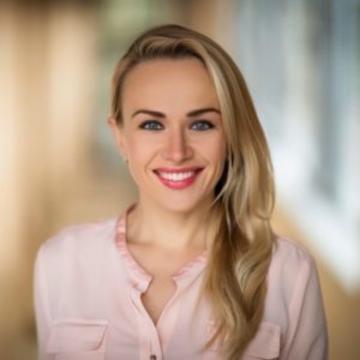Dr Natalia Efremova, co-founder of Deep Planet

Natalia Efremova has a PHD in Computer Science from the University of Kyoto, and an MBA from the University of Oxford. She has also previously worked as an Associate Professor in computer science, in Russia. Her research focuses on using AI and machine learning to achieve sustainable goals. After doing her MBA, she decided to start Deep Planet, and co-founded it with people she had met on her MBA course who all came from various different backgrounds.
Started in 2018, Deep Planet is a company which applies machine learning and satellite imagery for precision agriculture. It looks at different types of crops and tries to drive information on things such as soil moisture, crop yield and health, and nutrients, to help farmers. Deep Planet provides a platform for farmers to log into and input their information, which helps track all the important features of their farms. The idea behind the company is to use Machine Learning to help the agricultural sector, and the planet overall.
Deep Planet has a team of twelve at its core, many of whom are from the University of Oxford. They’ve secured some funding from private investors, mostly from within their network, but have also received research grants from the European Space Agency.

I never specifically wanted to become an entrepreneur, but it became the natural career to follow after doing my MBA course. After doing the course I wanted to try out the new skills I had gained from it, and the natural continuation seemed to be to continue with entrepreneurship and to try out different projects. I’m very interested in my area of research and have advised people on it before, and I was interested in how AI start-ups work. It’s a really new and fast-developing field of entrepreneurship, one that’s very different to what start-ups used to be. I believe it’s one of the most interesting things I’ve been involved in, it’s very new and there’s no framework around it.
What is your definition of entrepreneurship?
Entrepreneurship is the art and science of creating a new venture out of an idea, it’s a difficult and complex task, but a very interesting one.
How and when did you know your idea was good enough to develop it?
When my smart and talented MBA classmates decided to join me in developing it, and to support me. I realized that if my classmates in Oxford believed in the idea, it would be good enough to develop. My MBA course was made up of an amazing selection of skilled and unusual people, and I trusted that if they also believed in my idea, it would be good enough to develop.
What would you say are the top 3 skills that needed to be a successful entrepreneur? Why?
A desire to chase your goals and dreams despite all the circumstances. You need to believe in your idea enough to pursue and you need to be persistent in doing so. A willingness to learn new things, as you’ll learn a lot throughout the entrepreneurial process. An openness and readiness to fail. There will be a lot of failures as you try to develop your idea and it will change over time, which is something you need to accept and be open to.
What is your favourite part of being an entrepreneur?
Working with and getting to meet different people. I really like my team because it’s so diverse, and I think we’re great together. We work very closely and it’s great to have such a strong and tight-knit team of people on my side.
What individual, company or organization inspires you most? Why?
Demis Hassabis, the co-founder and CEO of DeepMind, which is an AI company and research lab. He created this truly beautiful thing with his company that I really admire. He was an inspiration to me even before I started Deep Planet, he’s a really important figure within AI and computer science, and is massively influential.
If you had 5 minutes with the above individual/ company/organization, what would you want to ask or discuss?
The field of AI is really huge. I would ask how he chooses what to work on next.
Also, I would ask him how he manages his time. I always wonder how people who work in academia and business manage to do both at the same time, because it’s something I struggle with, it’s really hard.
What has been your most satisfying or successful moment in business?
Signing on our first client, it was a feeling like no other. When you find someone who’s interested in what you’re doing and is happy with what they see, it’s a great sensation, and it makes the whole entrepreneurial process really rewarding.
What would you say have been some of your mistakes, failures or lessons learned as an entrepreneur?
I think in the past I’ve tried to do everything myself, and I’ve failed to delegate tasks, especially in the beginning. This was difficult for me and just the wrong approach overall, you can’t be a researcher and lead the research while administrating everything at the same time. At the start I didn’t have a choice as we didn’t have much funding, but I still could have started delegating more earlier on, trusted the team more, and not micromanaged people.
How have you funded your ideas?
We receive small funding from private investors in our network, but are mostly funded by ‘research in development’ grants, such as the grants from the European Space Agency, amongst others. Now we have paying clients.
Are there any sector-specific awards/grants/competitions that have helped you?
The European Space Agency grants, Copernicus incubation grant, Oxford Foundry program and many others. Such a rich ecosystem as Oxford really makes the difference.
What is good about being an entrepreneur in Oxfordshire? Bad?
The best thing about Oxford is the proximity you have to talent. Half of my employees are from the University of Oxford so it’s great to have those connections from the city. The only bad thing I can say about the area is the expensive cost of living! But the benefits definitely outweigh the negatives.
If a new entrepreneur or startup came to you looking for entrepreneurship resources, where would you send them?
I would recommend the Oxford Foundry and the Creative Destruction Lab (CDL), which provides great mentorship. There’s also many meet-ups and career fairs, which are really useful and beneficial for new start-ups. The Oxford AI society also provides a good network for students, as well as lectures and resources.
Have you faced any challenges as a woman entrepreneur? If so, how have you overcome them?
Yes, there’s many challenges as a woman in this space. The issue is two-fold, there’s the challenge of being a woman in technology, and then of being a woman entrepreneur. You need to work twice as hard and be more consistent than men, as you’re perceived as a weaker competitor in comparison to them. Women also need to have more meetings and pitches in order to get the same level of funding as men. This is because feedback shows that women are perceived as being less reliable, less confident, and sometimes even less charming than men, when applying for funding. To overcome this, me and my other co-founder, Sushma (another woman in tech) both just had to work more, for now there’s still no other way for women to get to the same place as men. I think shouting about how well you’re doing also helps. Once you start convincing people of how good you are, they’ll start believing in you. Although I was told I need to work more on this.
Do you have any advice for other women who want to be entrepreneurs?
I think it’s an area that requires a lot of self-discipline and self-confidence, and you need to believe in yourself. Don’t listen to other people who might say that you can’t do something, because you can. Being a woman doing a tech start-up isn’t what I imagined I’d be doing, as a young girl, but it’s totally feasible. You just need to be persistent, and it will happen.
What resources would you recommend for other women?
For those interested in these areas, there’s many communities which support women in machine learning and data science. There’s no community specifically for women entrepreneurs in Oxford, but there are ones elsewhere. I would recommend talking to other women and getting support from them, and just finding people who think like you. I found it helpful to do an MBA, but any course which gives you an overview of the strengths and weaknesses of women in tech is useful, anything which teaches entrepreneurship and leadership skills. You need to be able to identify your perceived weaknesses, and fix them.
How do you think institutions such as the University of Oxford could better support women entrepreneurs?
Courses on female leadership and negotiation skills would be helpful, which the Saïd Business School already provides, but they are not easily available to everyone. It would be useful to have them across the university in all disciplines. These courses need to discuss weaknesses in how women present themselves, and how they can overcome these. For example, women tend to negotiate less for themselves than men, and they need to be made aware of this to consciously overcome it. An advisory would also be useful, or a network promoting women in space, technology or machine learning.
Any last words of advice?
Don’t be shy and just try doing things you believe you can, or want, to do. Don’t let a lack of self-confidence stop you, if you want to try something just go and do it.
Share this
More news



